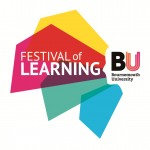The Festival of Learning enters its fourth year in 2016 and will be running from Saturday 25 – Wednesday 29 June. It’s a fantastic public engagement opportunity for BU to showcase the great research coming out of the university. The call for proposals is now open and the process for submitting an application is simple:
- Think of an idea for an event that demonstrates your research – will it be innovating and interesting to members of the public? Watch our video from 2015 for some inspiration.
- Decide if you want your event to be a bookable event that people can sign up for or whether you’d like a run a stall or drop in activity instead (i.e. an activity based on passing traffic rather than pre-bookings)
- Consider who you want to be your target audience (adults, families, businesses etc.)
- Consider whether your event meets the Festivals objectives, what you plan to do during the event, how it will appeal to your intended audience and what your attendees will get out of attending the event.
- Complete the Festival of Learning event application before January 31st 2016: see here (We are unable to accept late proposals due to the tight turn around between the call closing and review by the panel.)
If you would like to discuss an idea in more detail, please call/ email Naomi Kay (Public Engagement Officer) 61342/ nkay@bouremouth.ac.uk or click here for more detailed information about submitting a proposal.
 Call for Festival of Learning 2017 proposal is closing tomorrow!
Call for Festival of Learning 2017 proposal is closing tomorrow!










 Final Bournemouth University publication of 2025
Final Bournemouth University publication of 2025 On Christmas Day in the Morning…
On Christmas Day in the Morning… New Nepal scoping review on maternal & neonatal health
New Nepal scoping review on maternal & neonatal health Fourth INRC Symposium: From Clinical Applications to Neuro-Inspired Computation
Fourth INRC Symposium: From Clinical Applications to Neuro-Inspired Computation ECR Funding Open Call: Research Culture & Community Grant – Application Deadline Friday 12 December
ECR Funding Open Call: Research Culture & Community Grant – Application Deadline Friday 12 December MSCA Postdoctoral Fellowships 2025 Call
MSCA Postdoctoral Fellowships 2025 Call ERC Advanced Grant 2025 Webinar
ERC Advanced Grant 2025 Webinar Horizon Europe Work Programme 2025 Published
Horizon Europe Work Programme 2025 Published Horizon Europe 2025 Work Programme pre-Published
Horizon Europe 2025 Work Programme pre-Published Update on UKRO services
Update on UKRO services European research project exploring use of ‘virtual twins’ to better manage metabolic associated fatty liver disease
European research project exploring use of ‘virtual twins’ to better manage metabolic associated fatty liver disease